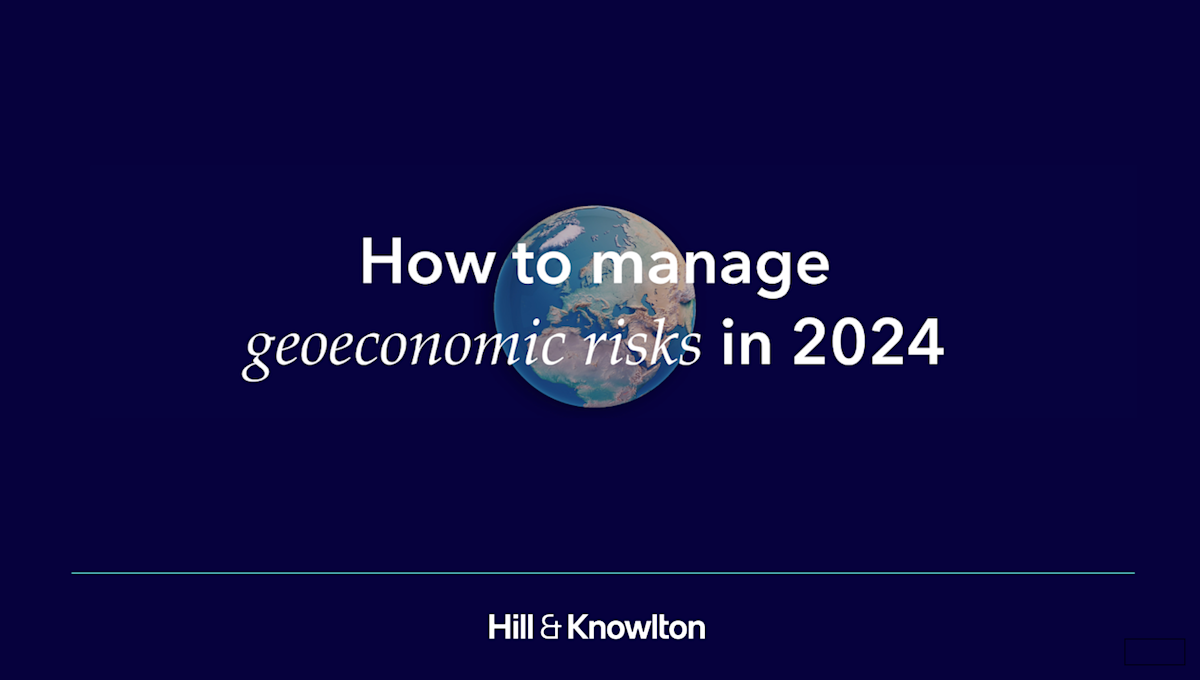
Mastering the Geoeconomic Chessboard: Navigating Risks in 2024 and beyond
What are the key global trends impacting international business this year, and how can companies mitigate risk and secure long-term resilience? Leading analysts Mikael Wigell, Research Director, Geoeconomics at The Finnish Institute of International Affairs, and Elvire Fabry, Senior Research Fellow, Geopolitics and Trade at the Jacques Delors Institute, joined Philippe Maze-Sencier, Hill & Knowlton's Global Chair, Public Affairs, for an insightful discussion on the emerging geoeconomic landscape.
If you were unable to tune in live and would like to catch up on what you missed, please read on for the recap and recording.
From market capitalism to strategic capitalism
Economic policy has evolved into a potent strategic instrument, seamlessly intertwining with national security objectives. The convergence of economic and security policies is evident in several key areas, including the heightened utilization of sanctions, the instrumental role of corporations in espionage, and the surge of strategic corruption. This symbiotic relationship underscores the pivotal role economic strategies play as a tool in bolstering and fortifying national security interests.

Business leaders and policymakers used to think that economic interdependence was a good thing, but that's out the window. The focus is now on risks and vulnerabilities, which means that leaders believe that the economy and business have become too strategically important to be left to economists and businesses alone. Governments are clearly back in the economy.
Research Director, Geoeconomics, The Finnish Institute of International Affairs
The landscape of geoeconomic dynamics is undergoing a transformative shift, marked by both regional fragmentation and increased government intervention, particularly within critical sectors like technology. This heralds the emergence of a novel economic paradigm, one that departs from market capitalism's historical emphasis on minimal state involvement driven solely by economic considerations. Now we are witnessing the rise of strategic capitalism, in which heightened state intervention, fuelled by security imperatives, becomes an increasingly predominant force shaping economic paths.

What we're facing is not a deglobalization, it's a 'slowbalization'. It's a slowing in the growth of trade at the global level.
Senior Research Fellow, Geopolitics and Trade, The Jacques Delors Institute
As companies strategically mitigate risks and broaden operational horizons, supply chain management takes on greater significance. We can anticipate a shift towards heightened regulation, driven by an imperative of governments to assert control over supply chain dynamics. This regulatory wave extends beyond corporate borders, affecting foreign investments and reshaping the very landscape of international economic engagement. Says, Fabry:
“We can expect less new investment in China, with companies that are already there trying to preserve their investment and possibly even increasing it. Also, we have a big group of nonaligned countries that could see increased investment as diversification surges. “
In the framework of strategic capitalism, businesses must adapt to a reality in which the unrestricted flow of capital, goods and data can no longer be taken for granted. The competitive edge now belongs to enterprises capable of navigating these currents seamlessly, minimizing friction. The control of critical economic flows is an indispensable skill for enterprises aspiring to not just survive but thrive in this dynamically evolving economic landscape. Mikael Wigell says:
“Think of the Chinese electric vehicles producers who are now overtaking traditional car producers in many markets around the globe. Tesla is the second electric vehicle producer these days, not number one anymore. Why? It's because the Chinese control almost the entire supply chain of production. This means that they encounter less friction and they are not relying on an outsourced global supply chain, but on leveraging Chinese industrial policy. “
In this new environment, corporations must recalibrate their risk assessments, with a heightened emphasis on public policies that are strategically designed to keep potential competitors in check, such as sanctions and export controls. This proactive approach is essential for maintaining a robust and competitive position in the evolving business landscape. Elvire Fabry says:
“We may see that China will be more aggressive in trying to prevent or to limit any diversification effort by implementing sanctions or by rewarding some investors.“
The need for corporate agility and coping capacity
In the contemporary landscape of strategic capitalism, it is crucial for businesses to invest in becoming more agile in the regulatory sphere. The ever-shifting regulatory terrain not only alters the rules of engagement but also incurs costs. By proactively adapting to these changes, businesses not only stay ahead of the curve but also effectively navigate the challenges posed by evolving regulations, says Elvire Fabry:
“As countries are equipping themselves with their economic security strategy, we need to have business stepping in and making themselves heard. Today we lack forums of discussion to have that dialogue between businesses, governments, or public institutions.“
Elvire Fabry is also concerned that companies might limit their de-risking actions to certain sectors:
“For example, we need to have a much better assessment of the innovation capacity in China because this ecosystem of innovation will likely expose international businesses to rapid regulatory changes.“
Mikael Wigell emphasizes the imperative for companies to brace themselves for an impending surge in regulations along with associated costs. Furthermore, he underscores a paradigm shift in the evaluation of supply chains, urging businesses to consider resilience alongside efficiency in their planning and operations. As part of this strategic recalibration, Wigell advocates for a thoughtful reconsideration of investment geographies, aligning corporate strategies with the evolving dynamics of the regulatory and economic landscape:
“Protectionism is back. That means business models that rely on open global markets are a bit in trouble. In fact, instead, businesses will have to learn how to make use of the new industrial policies in their home and other friendly markets.“








